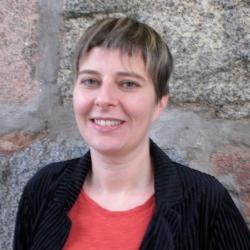In my scholarship on reproduction I draw on 5 knowledge domains: 1) Queer Theory which questions heterosexual and gender binary norms and overcomes identity politics, thus going beyond essentialist LGBTQI* politics; 2) Transgender Studies which differs from Queer Theory, as gender is at its forefront and not sexuality; 3) decolonial feminist STS (Science and Technology Studies); 4) Bio-Cultural Studies, a term suggested by Charis Thompson and Sarah Franklin; and 5) Philosophy in the form of ethics. My methodology consists of a participatory, mixed-method and multi-method design, drawing on a range of interconnecting sociological, ethnographical, feminist, queer, and philosophical methods. Thus, they reflect the interdisciplinarity of the knowledge domains on which my research interests are based.
My previous Marie Skłodowska-Curie Action Fellowship (MSCA) ‘QTReproART: Towards an Inclusive Common European Framework for Assisted Reproductive Technologies (ART): Queer and Transgender Reproduction in the Age of ART’ examined the experiences, practices and possible improvements of preserving fertility and achieving reproduction of queer and transgender people in Europe. Most research on queer and trans people’s use of ART is performed in English-speaking, western European countries, much less in central European ones and virtually none in eastern European countries. However, eastern Europeans and their clinics play a major role in European ART use through ‘fertility tourism’ and the provision of biomaterials (eggs, sperm, etc.). This 3-stage comparative project examined the regulations of ART and the experiences of self-identified queer and transgender people with ART in 6 purposely selected European countries: Austria, Estonia, Poland, Sweden, Spain and the UK in order to draft a more inclusive common European framework for ART. Innovative methods such as community feedback loops help to create outcomes that impact not only academia, but also ART’s policies (clinics and staff) and legislations (state politics) on LGBTQI* rights and ART, and LGBTQI* people and their families. More about the outcomes (publications, workshops, conferences) can be found here, https://cordis.europa.eu/project/id/749218.
One of my current projects is ‘Towards an Inclusive Reproduction and Parenthood despite COVID-19’: The number of people seeking to reproduce using Assisted Reproductive Technologies (ART) is rising both globally and in Europe and yet, the regulation of access to particular ART procedures in different European states differs greatly and thus gives rise to cross border fertility travel. However, as the COVID-19 pandemic led to drastic national measures, borders were closed and ART treatments put on hold in many states. Achieving pregnancy via ARTs is not enough, further challenges arise in obtaining legal parenthood status. The proposed project builds on previous EU funded research, ‘QTReproART’. Both studies depart from the premise that an adverse consequence of reproductive technologies is that access to ART and obtaining legal parenthood is unevenly distributed among different parts of the population. During COVID-19, challenges and obstacles in reproduction and parenthood for queer and trans people seem to have been intensified. The COVID-19 pandemic is not only a medical but also a social threat. It is disrupting our society and revealing inequalities and discriminations.
The second bigger and overarching project encompassing all my projects on reproduction is an ethics of reproduction. I began working on this topic when I was a visiting researcher at UC Berkeley (2013-17) as part of the Beatrice Bain Research Group in the Department for Gender and Women’s Studies and at the Center for Science, Technology, Medicine and Society working on a project with the title Reproductive Ethics: Disability and Queer-Feminist Justice. The first part is an applied ethics on new reproductive technologies concerning the normative and non-normative aspects of these technologies and how negative aspects such as a new form of eugenics, biocapitalism, biocolonialism, bioprecarity and stratified reproduction could be avoided and a form of reproductive justice achieved. The second part is a meta-ethics about reproduction analysing key concepts in the context of reproduction such as justice, recognition (intersectionalities), interdependence, capabilities, and transformative ethos. Preliminary thoughts and outcomes have been published in:
- ‘Reproductive Ethics: An Example of an Allied Dis/Ability-Queer-Feminist Justice’ in Queering Paradigms VI: Interventions, Ethics, and Glocalities. Ed. Bee Scherer. Oxford: Peter Lang, 2016;
- ‘Prekärer Sex: eine queer-feministische Dis/Ability Ethik’ in Neuere Aspekte in der Philosophie: Aktuelle Projekte von Philosophinnen am Forschungsstandort Österreich. (Volume 1 of Women Philosophers at work, A Series of SWIP-Austria) Eds Yvanka B. Raynova, Brigitte Buchhammer. Vienna: Axia Academic Publishers, 2015;
- ‘Queer Reproduction Revisited and Why Race, Class and Citizenship Still Matters: A Response to Cristina Richie’ Bioethics 32/2, 2018;
- ´Bioprecarity through Categorical Framing’ in Bodily Interventions and Intimate Labour: Understanding Bioprecarity. Eds Gabriele Griffin and Doris Leibetseder. Manchester: Manchester University Press, 2020.
My future research will deal with strategies for decolonizing reproduction, as for example used in the reproductive justice movement, and will consider how certain intersections such as gender, sexuality, migration, ‘race’, class, disability, etc. have an influence on reproductive developments, not only concerning human, but also animal, plant and posthuman reproduction e.g. in ART, environmental issues, cyborgs and Artificial Intelligence. Reproduction will be the most crucial issue and challenge in future for the survival of humanity and the global eco-system.

